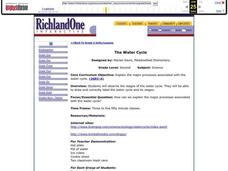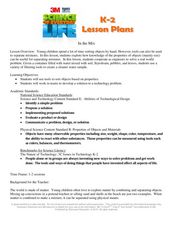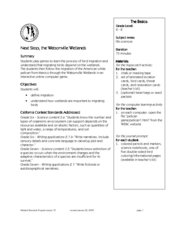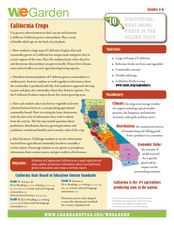Curated OER
Let's Take a Rock Apart!
Learners examine a crushed rock and sort the minerals they find in that rock by color and other properties.
Curated OER
Super Stream Keeper's
Students are introduced to Delaware's waterways as precious resources used for drinking water, water for agricultural and industrial uses, recreational areas, and as habitats for wildlife. They are introduced to wastewater discharges,...
Curated OER
Rocks, Minerals, and Erosion
Fourth graders describe the difference between minerals (composed of the same substance throughout) and rocks (composed of two or more minerals). They recognize that there are three classes of rocks: igneous, sedimentary, and metamorphic
Curated OER
Cloud in a bag
Students relate the states of matter and clouds. In this environment activity, students create a chart of information they know about clouds. Students put an ice cube in a bag and tape to a window. Students watch for condensation....
Curated OER
The Water Cycle
Second graders conduct an a water cycle experiment. In this water cycle lesson, 2nd graders observe a puddle of water, they predict how it got there and what will happen to it. Students watch a demonstration on the water cycle and...
Curated OER
Building a Butterfly Garden
Students examine the habitat and life cycle of a butterfly. In this early childhood lesson plan, students identify the parts of a butterfly, as well as the stages of the butterfly life cycle. Students also plant a garden in which they...
Curated OER
Beanie Baby
Learners will explain the importance of soybeans. In this science lesson, students participate in making a "beanie baby" necklace. Additionally, learners observe their soybeans for germination and growth for 7-10 days. Students record...
Curated OER
In the Mix
Students construct a water filter. In this engineering lesson, students discover how to construct a water filtration system. Students work in groups to sort tools by their properties. Students analyze and construct a water filtration...
Curated OER
Discovering the Wetlands!
Students name wetland plant and animal life. In this ecosystem lesson students go birdwatching and interpret native plants through art.
Curated OER
Next Stop, the Watsonville Wetlands
Students study bird migrations and the importance of wetlands. In this migration lesson students play a game and complete a computer activity.
Curated OER
Searching for life
Students explore the possibility of life on Mars and what that might look like. In this planetary lesson students complete several activities on looking for life on Mars.
Curated OER
Landforms in a Tub
Fifth graders use common household items to build landforms and simulate weathering and erosion.
Curated OER
Water on the Move
Young scholars play a "Water on the Move" game to deepen their understanding of the water cycle.
Curated OER
Food Chains
Fourth graders study food chains, producers, consumers, and decomposers. They play a food chain game and create food chain mobiles or posters. They take a nature hike around the school and observe various parts of a food chain.
Curated OER
Where Does All the Water Go?
Students view a demonstration of how groundwater flows and define several related vocabulary terms. They complete a worksheet, participate in discussion and make a poster.
Curated OER
I Feel Renewed!
Students participate in a simulation of the equal and unequal distribution of the earth's renewable resources. They discuss renewable resources and how food resources can increase and decrease, participate in the simulation, and analyze...
Curated OER
Understanding How Potatoes Grow
Second graders make a KWL chart and brainstorm what they need for the project of growing potatoes. They choose one potato and plant it in water or peat moss cups and choose a location in which meets the needs of the plants and make their...
Curated OER
Air Matters
Students research the affects that particulate matter has on the quality of our air and our health. Students analyze a streaming video on air pollution and complete an internet research assignment to find ways to reduce particulate...
Curated OER
Why Does a Puddle Shrink?
Fourth graders describe the relationship between heat energy, evaporation and condensation of water on Earth. They compare evaporation rates when the back of the hand and an equal area of a paper towel are moistened with the wet swab.
Curated OER
Alphabet Letter a Or N Theme
Students draw a tree with acorns. They depict roots and an acorn in the soil to review plant growth and practice handwriting letter A or letter N in the writing lines. They cut an additional page for the mini-book to include the word...
Curated OER
Water Filtration
In this water pollution and filtration lesson plan, 5th graders read the story 'Saving Salila's Turtle' and discuss the impact pollution has had on the Ganges river. Students work in groups to brainstorm different types of water...
Curated OER
California Crops
Students explore agriculture by researching the native food crops of California. Students define a list of agriculture vocabulary terms and analyze maps of California which explain which foods come from which area. Students write a...
Curated OER
Nature's Recycling Program
Students identify what materials make up compost. In this science of recycling lesson, students explain the benefits of composting determine how compost is a good plant fertilizer.
Curated OER
Reptiles and Amphibians
Fourth graders explore biology by viewing animal videos in class. In this amphibian and reptile lesson, 4th graders identify the key differences between reptiles, amphibians and other animal classifications. Students view video clips in...

























